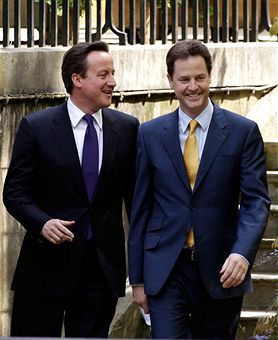 An intriguing argument from the Economist’s Bagehot this week: the government’s liberal prisons policy will force Coalition 2.0 to tack to the right on Home Affairs.
An intriguing argument from the Economist’s Bagehot this week: the government’s liberal prisons policy will force Coalition 2.0 to tack to the right on Home Affairs.
‘If the Lib Dems’ sway on these issues was foreseeable, so are its political dangers. One is Tory anger. Even some of the Conservative MPs who agree with the Lib Dems on control orders worry about their liberal line on crime. Behind the scenes, figures from both parties are coming together to plan “coalition 2.0”—a policy programme for the second half of the parliament. Among the rumoured Tory representatives are confirmed hawks such as Michael Gove, the education secretary, Owen Paterson, the Northern Ireland secretary, and Tim Montgomerie, a well-known blogger. They are likely to press for a grittier home-affairs policy.’
The analysis presumes that the coalition will fail in this regard – why else would there be a need to become more authoritarian? But the government’s liberal agenda may soften the trials of the future if successful. Welfare reform will reduce the need to import cheap menial labour, dispel the social dissolution of worklessness and perhaps even encourage the odd crook to go straight. Protecting first time and petty offenders from habitual and hardened criminals, by reducing sentencing and sponsoring remedial schemes, could reduce re-offending.
If a tougher line is needed, then the two parties are close on anti-social behaviour and policing. The Lib Dem manifesto’s approach to crime is straight forward: 3,000 extra policemen on the beat. This Tory-led coalition will likely resuscitate that pledge when cuts to the Home Office budget relax in any event. The stumbling blocks will be retightening sentencing reform and prison construction; but, as the Tuition Fee compromise proves, nothing is insurmountable in government.






Comments